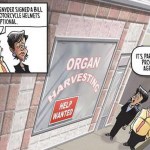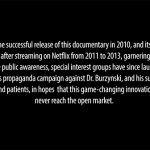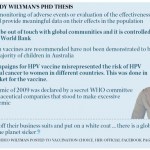Science
Katie May was a model, and by all accounts a very successful one, having appeared in Playboy, Sports Illustrated, and other magazines and websites. Self-proclaimed the "Queen of Snapchat," she also had nearly two million Instagram followers and was a major social media force, having recently parlayed her modeling and social media career into becoming an entrepreneur. She also died unexpectedly on Thursday night at the too-young age of 34, leaving behind a seven-year-old daughter. What makes May's tragic death an appropriate topic for this blog is not so much her young age but rather the…
In yesterday's post about the lack of money in academia, I mentioned in passing that lack of funding is part of the reason for the slow pace of progress on improving faculty diversity. That is, we could make more rapid progress if we suddenly found shitloads of money and could go on a massive hiring binge, but in the absence of flipping great wodges of cash, change comes more slowly.
This, naturally, sparked a sort of morbid curiosity about whether the scale of this problem would be quantifiable, and of course, there's the AIP Statistical Research Center offering numbers on all sorts of…
A long-ish stretch of time, but I was basically offline for a bunch of that because I needed to finish a chapter I was asked to contribute to an academic book. So there are only four physics posts from Forbes to promote this time:
-- 'The Expanse' Is A Rare Sci-Fi Show That Gets Simulated Gravity Right: Another post on the SyFy adaptation of "James S. A. Corey"'s books, talking about a nifty bit of visual effects that nods at the Coriolis force you'd see on a rotating space station.
-- What Is The Quantum Pigeonhole Principle And Why Is It Weird?: A paper published in the Proceedings of the…
This one was a whole bunch of work for one smallish shot...
So, in past rounds of "science-y things with my fancy camera," I looked at the effect of ISO settings and apertures. This time out, I wanted to look at something moving, and the way that it blurs with increasing exposure time.
My initial thought was to try to take pictures of a falling ball, but it's too hard to get that to work consistently without setting up some kind of electronic trigger, and I wasn't willing to do that. But, of course, a swinging pendulum will always be in a relatively narrow range of positions, making it a…
One of the things about being a physicist that makes it tough to have any sensible work-life balance is that I'm constantly seeing little things and thinking "Oooh! Physics!" then getting distracted from what I'm actually supposed to be doing. Take, for example, our bathroom sink.
I have noticed, from time to time, a weird effect where the stream of water coming out of the faucet, which normally is fairly straight, will spread out when the water level in the container below gets close to the faucet. This turns out to be damnably difficult to replicate, though, and I've spent more time than I…
It's a seldom mentioned aspect of my professional history that I used to do a lot of trauma surgery in my youth. I did my residency at a program that included a county hospital with a busy trauma program where I saw quite a bit of vehicular carnage and an urban hospital (which has since closed) where I saw a fair amount of what we in the surgery biz call gun and knife club action. During my time as a PhD student, I moonlighted as a flight physician for the local helicopter rescue service, Metro Life Flight, where I took care of patients with everything from cardiac disease requiring transfer…
The Center for Quantum Technologies is running a "Quantum Shorts" contest, where they solicited short stories exploring some aspect of quantum physics. They cut their large number of applicants down to two short-lists of ten, one for the "Open" category, and one for the "Youth" category. They'll be giving out a "People's Choice Award" based on Internet voting, so you can go over there and vote for your favorite.
There are also judged prizes, and I'm serving as a judge for the "Youth" category (and already sent in my rankings), so it would be inappropriate for me to plug any particular stories…
Over at Scientific American, Amanda Baker has a story about what scientists say they would tell their younger selves.
I reached out to eight of my colleagues who are currently in STEM fields and asked them a series of questions about their childhood interests in science, school experiences, and roadblocks that they faced on their path from elementary school to their current positions. [...]
Their feedback covered not only what drew them to science, but also what had almost pushed them away. Below I have consolidated the feedback into five main points, including the advice they would give…
One of the recurring topics I write about is, of course, cancer quackery. It goes right back to the very beginning of this blog, to my very earliest posts more than 11 years ago. Over the years I've covered more cases than I can remember of patients relying on quackery instead of real medicine. In particular, tales of children with highly curable cancers being treated with quackery bother me most of all. Many have been the examples throughout the years: Abraham Cherrix, Katie Wernecke, Chad Jessop, Daniel Hauser, Sarah Hershberger, and teens like Cassandra Callender, who wanted to use…
I feel as though I'm experiencing an acid flashback to 2011, and I've never in my entire life once tried acid—or any mind-altering substance other than booze.
What am I talking about? Let's take a trip down memory lane, if you will, back to those halcyon days of—oh—five years ago. That was the time when I first took an interest in the Polish oncologist wannabe named Stanislaw Burzynski. Although I had mentioned him before because he featured prominently in Suzanne Somers' 2009 paean to quackery Knockout: Interviews with Doctors Who Are Curing Cancer–And How to Prevent Getting It in the First…
I remember my PhD thesis.
In particular, I remember the years of work that went into it. I remember being grilled (with good, constructive intent) by my thesis committee a couple of times a year as I worked on it. I remember the many, many hours spend writing it. And, above all, I remember the hour-long seminar I had to give, followed by a couple of hours defending my thesis. The PhD thesis defense is usually the most stressful thing that PhD candidates go through on the path to earning their degree. Certainly it was for me.
Of course, the PhD thesis defense does contain a bit of an element…
Having picked up a new phone last week, it seems sort of appropriate to give a photo-a-day to a picture taken with that phone, as a kind of test. Also, I realized while on the way to SteelyKid's taekwondo class that I had forgotten to take any photos with the good camera, and wanted some insurance.
So, here's a shot of the very early crescent moon just after sunset, taken from the parking lot at Panera where we got dinner before class.
Crescent moon just after sunset, taken with my new phone.
Which, you know, isn't too bad, given the kind of difficult lighting conditions. This is, of…
This post will be different than my usual post. Let's just say that it has to do with quackery of a different kind than I usually write about here. It's about a public health disaster that was entirely preventable and had nothing to do with vaccines. It has to do with government malpractice on an epic scale, right here in my very own state. It's a story that's huge here in Michigan but doesn't seem to be penetrating the national news very much, at least not yet. I suspect that my international readers, most of whom are likely unaware of this story, will have to pick their jaws up off the…
It's an understatement to say that I'm not exactly a fan of the National Center for Complementary and Integrative Health (NCCIH), the institute formerly known as the National Center for Complementary and Alternative Medicine (NCCAM) and, even a year after its name change, probably still better known by its old moniker. Just type "NCCAM" or "NCCIH" into the search box of this blog if you don't believe me. Basically, it's an institution forced upon the National Institutes of Health in the 1990s by Senator Tom Harkin (D-IA), a woo-friendly senator who believed that bee pollen cured his allergies…
Vaccines and the antivaccine movement were in the news a lot in 2015. The year started out with a huge measles outbreak originating at Disneyland over the holidays last year and dominated news coverage in the early months of 2015. This outbreak had enormous consequences. It galvanized public opinion such that something I had never thought possible before, least of all in the hotbed of the antivaccine movement that is California, became possible. After a prolonged debate, the California legislature passed SB 277, a law that, beginning with the 2016-2017 school year, eliminated nonmedical…
I've frequently noted that one of the things most detested by quacks and promoters of pseudoscience is peer review. Creationists hate peer review. HIV/AIDS denialists hate it. Anti-vaccine cranks like those at Age of Autism hate it. Indeed, as blog bud Mark Hoofnagle Mark Hoofnagle, pointed out several years ago, pseudoscientists and cranks of all stripes hate it. There's a reason for that, of course, namely that it's hard to pass peer review if you're peddling pseudoscience, although, unfortunately, with the rise of "integrative medicine," it's nowhere near as difficult as it once was.
Be…
Homo naledi and the Chamber of Secrets ~ Psychology's Inner Demons ~ Chilesaurus: The One That Went Vegan ~ Neurons Alter DNA All Day, Every Day
Popular science fans may recognize some of these colorful titles from the most recent publication of Discover Magazine's 100 Top Stories of 2015. We at Atheists Talk enjoy a good science-ing now and then, and this Sunday we're going to talk about some of the stories shared by Discover. It's going to be a science smorgasboard extravaganza! Join Brianne Bilyeu, August Berkshire and Maddy Love as they nerd out about the science of 2015.
Listen to the…
Christmas and New Years are almost here. As a result, as is always the case this time of year, we're being flooded with "year end" lists. These lists are a fun distraction that I actually rather look forward to as an amusing (and sometimes annoying) year end tradition. In particular, I'm a sucker for "best of the year" and "worst of the year" lists, particularly the latter. Unfortunately, I've usually been too lazy to construct such lists of my own, but maybe this year will be different and next week I'll do so. Or not.
Be that as it may, it gave me a bit of a chuckle to see that Mike Adams…
A couple of weeks ago, I gave a talk at TEDxAlbany on how quantum physics manifests in everyday life. I posted the approximate text back then, but TEDx has now put up the video:
So, if you've been wondering what it sounded like live, well, now you can see...
[NOTE added 12/23/2015: It would appear that the offending article has been taken down. I, of course, have screenshots, and, of course, the Google cached version is still around for the moment.]
Anaphylaxis can be deadly. Anaphylaxis can kill. More than that, anaphylaxis can kill pretty quickly.
Even the most dimwitted purveyor of "natural" cures should know that and stay away from "natural" treatments for anaphylaxis, while the smarter snake oil salesmen also know that you can't afford to mess around with a medical condition that can cause such rapid deterioration from seemingly perfectly…













